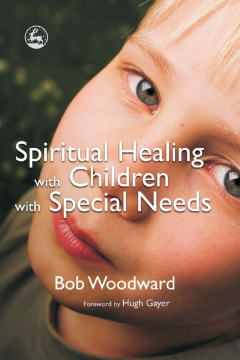
Additional Information
Book Details
Abstract
Bob Woodward, a respected member of the National Federation of Spiritual Healers, and a senior co-worker at the Sheiling School, a Camphill Centre, draws on the practice both as a healer and curative educator in order to share key concepts of both areas of experience with the reader. Examples of individual healing sessions with children with a variety of special needs demonstrate the part that spiritual healing can play in calming emotional disturbance, and helping to restore harmony to body, soul and spirit: a marked improvement in the ability to relate to both peers and adults was noticed by carers and teacher.'
- The Christian Parapsychologist
Spiritual Healing with Children with Special Needs gives a fascinating account of individual healing sessions with children with complex special needs and moderate to severe learning difficulties. Drawing on his experience as a qualified spiritual healer and senior co-worker at The Sheiling School, a Camphill Centre, Bob Woodward shows how spiritual healing can help children with special needs to achieve peace and relaxation.
From his perspective as both spiritual healer and curative educator, the author introduces the key concepts of both subject areas to the reader and explains how the two disciplines can be combined and applied, providing case examples of healing sessions with children with a range of special needs, including autism, epilepsy and emotional and behavioural difficulties. The author demonstrates the benefits of spiritual healing for these children as a natural, non-invasive, holistic approach that restores balance and harmony to body, soul and spirit.
This unique book will be of interest to parents and professionals involved with special needs children, as well as practitioners of and those interested in spiritual healing.
Bob Woodward M.Ed, M.Phil is a qualified spiritual healer and curative educator. He has lived and worked with children and youngsters with special needs in a Camphill Community school setting in Thornbury for over 30 years. He has a particular interest in autism and has co-authored a book on approaching autism holistically, and authored a book on spiritual healing.
The book will appeal to a wide range of people and it gives information to assist in the understanding of the behaviour of children and adolescents with learning disabilities. It is also helpful in describing the approach to children and adults with learning disabilities within Camphill schools and communities.
Heather Bullen, Scottish Journal of Healthcare Chaplaincy
This book will appeal to those wishing to know more about the complementary approach to spiritual healing.
Speech & Language Therapy in Practice
This modestly written, yet profound book is warmly recommended as a vivid description of how spiritual healing can be harmoniously and fruitfully integrated in a curative eductaional setting.
Journal of Curative Eductaion and Social Therapy
Table of Contents
| Section Title | Page | Action | Price |
|---|---|---|---|
| Prelims [Preface| Foreword| Acknowledgements] | |||
| Part A | |||
| Who are sub-Saharan Africa’s extreme poor and how to target them | |||
| 1. What works for Africa’s poorest? | |||
| David Hulme and David Lawson | |||
| 2.Defining, targeting, and reaching the very poor in Benin | |||
| Anika Altaf and Nicky Pouw | |||
| 3. Towards inclusive targeting: the Zimbabwe Harmonized Social Cash Transfer (HSCT) programme | |||
| Bernd Schubert | |||
| Part B | |||
| Africa’s children and youth | |||
| 4. Africa’s extreme poor: surviving early childhood | |||
| Lawrence Ado-Kofie and David Lawson | |||
| 5. Cash for care? Researching the linkages between social protection and children’s care in Rwanda | |||
| Keetie Roelen, Helen Karki Chettri and Emily Delap | |||
| 6. Promoting employment, protecting youth: BRAC’s Empowerment and Livelihoods for Adolescent Girls Programme in Uganda and Tanzania | |||
| Nicola Banks | |||
| Part C | |||
| Getting Africa to ‘work’ | |||
| 7. Female engagement in commercial agriculture, interventions, and welfare in Malawi | |||
| Ralitza Dimova and Ira N. Gang | |||
| 8. Effects of food assistance: evaluation of a food-for-training project in South Sudan | |||
| Munshi Sulaiman | |||
| 9. The role of public works in addressing poverty: lessons from recent developments in public works programming | |||
| Anna McCord | |||
| 10. Exploring potentials and limits of graduation: Tanzania’s Social Action Fund | |||
| Usha Mishra and Emmanuel J. Mtambie | |||
| 11. Do ‘graduation’ programmes work for Africa’s poorest? | |||
| Stephen Devereux | |||
| Part D | |||
| Poverty reduction for Africa’s poorest – implementation and policy thoughts | |||
| 12. Institutional and policy challenges in the implementation of social protection: the case of Nigeria | |||
| Rebecca Holmes | |||
| 13. The conditions for conditionality in cash transfers: does one size fit all? | |||
| Luca Pellerano and Valentina Barca | |||
| 14. Effective cash transfers for the poorest in Africa: a focus on supply capacity | |||
| Francisco Ayala | |||
| 15. Access to justice for the very poorest and marginalized in Uganda | |||
| Adam Dubin and David Lawson | |||
| 16. Conclusion | |||
| David Hulme, David Lawson and Lawrence Ado-Kofie | |||
| Index |
